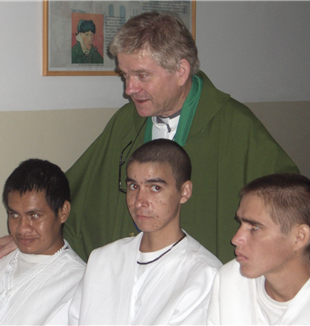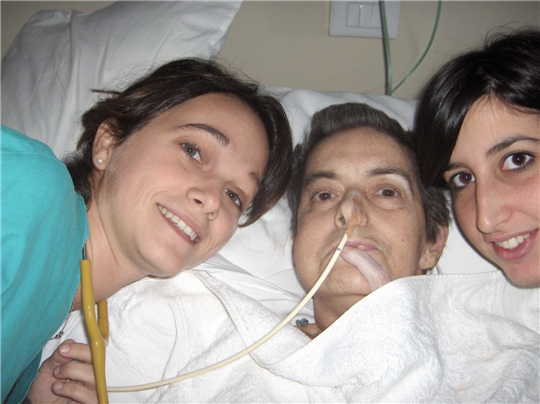
Room for Everyone, Even for Me
A memory of Father Aldo Trento and a Love powerful enough to break down many barriersIn the summer of 2007, just a few days after earning my medical degree, I traveled to Paraguay to be with Fr. Aldo. I embarked on this journey full of joy and anticipation — I remember smiling continuously at the airport, my heart bursting with excitement. I was encouraged to go by my friend Fr. Sottopietra, who suggested I spend a few months at the clinic there. Our group included me and Marianna, both freshly graduated doctors; Lucia, a medical student; and Camilla, a physiotherapist.
For two months, we lived in paradise amidst the difficulties of Asunción. It’s hard to imagine if you’ve never been there: the parish of San Rafael is an oasis in the desert. Fresh water, stunning flowers, exotic animals, the best pizza in the world, a library, and wooden tables that made me feel like I was in a Dolomite mountain lodge. A castle instead of a school, and so much love amidst so much suffering.
What I remember most vividly, even nearly 20 years later, is the love — more than the suffering, the terrible diseases, the inhuman injustices, or the poverty. The love with which Fr. Aldo kissed his patients — the outcasts, the discarded of the discarded. It didn’t matter if they smelled bad, were dirty, or covered in sores. The love of the nurses who, after bathing the patients, would pause to apply makeup, nail polish, and ribbons in their hair. The love the patients showed to Fr. Aldo every time he carried the Blessed Sacrament to their bedside (three times a day, every day), letting them kiss it — or perhaps more accurately, allowing Christ’s saving kiss to reach them.
When we first arrived at the clinic, Fr. Aldo introduced us to the Director. In a small chapel at the center of the hospice was Him, the Blessed Sacrament. He had us kneel there, and we stayed for what felt like an eternity. I wasn’t used to praying — certainly not that often, that long, or on my knees. Definitely not in the middle of the hospital ward.
In one of my first letters to my then-fiancé (now my husband of nearly 17 years), I wrote this:
Being here is worth more than a lifetime. Today, I had a silent conversation of love with Guglielmina. She’s a patient who can only communicate by blinking. I leaned in and kissed her; she replied with a blink. I kissed her twice, and she blinked twice. Then I stopped and just looked at her. She looked back at me, and suddenly her eyes lit up, and she smiled — a smile worth more than life itself. Imagine, at first, I felt a little disgusted by her because she’s so thin, smells a bit, and always seems like she’s sleeping. But she knows when someone loves her, and she knows how to love back.
Looking at the photos I found, including one of Guglielmina, I’m struck by the physical closeness we shared with the patients. We hugged them, laughed with them, talked with them, and held their hands. That love we saw in Fr. Aldo and the nurses slowly became our own. That love was the only thing powerful enough to break down so many barriers: language, status, smell, and the fear of getting sick. I remember it took me a long time to hold hands with a young man with AIDS. I was afraid to touch him. My heart was made of stone. But being there, a miracle happened — my heart warmed, and little by little, I let myself be loved by that Love. On my knees, before the Blessed Sacrament or by the bedside of the patients.
In a letter to Fr. Sottopietra, I wrote this: “There is room for everyone here, even for me.”
Fr. Aldo was already unwell, suffering from depression and diabetes, but that didn’t stop him from taking us to magnificent places: the Iguazu Falls, an unforgettable 1,000-kilometer tour through the perils and wonders of Bolivia to explore the best-preserved Jesuit Reductions, which he loved so much. He almost exclusively ate coconuts, cracking them open even while driving. I’ll never forget how he taught us to open coconuts — wrapping them in a shopping bag and breaking them open, a task that required strength and little finesse. We, clumsy Western girls, couldn’t manage it, and he laughed so much.
I remember one Saturday afternoon when a family arrived from a very poor village in northern Paraguay after weeks of travel. They knocked on the parish door, begging to see Fr. Aldo. We called him, and when he arrived, walking slightly hunched and frail but with the eyes of a child, the parents knelt, embraced him, and handed him their sick daughter’s sock, asking for a miracle. I was speechless. Later, I learned that in Latin American spirituality, there is profound reverence for priests, which is part of their devotion to the Lord. But this did not diminish the faith I witnessed that afternoon. God chooses flesh-and-blood men and women — limited, temporal — to reach the least among us. To reach everyone. Even me.
On our honeymoon, I took my husband there, like a sort of pilgrimage. Now that I think about it, it’s not so different from that family bringing their daughter’s sock. I brought our new family there. I wanted him to see. Words aren’t enough.
Today, almost 20 years later, we live in America with our five children. I wanted to go on a mission to some place like Paraguay, but the Lord brought me here. Fr. Aldo and his unwavering faith left an indelible mark on my heart — a longing and a nostalgia for a life given totally, radically, for Christ. This still accompanies me, even today, on the other side of the world — or rather, the equator. I am eternally grateful. Now, I pray to him in heaven — the one who allowed my heart of stone to be shattered and let Another enter.
To God, Father Aldo.
Margherita, Cincinnati, OH